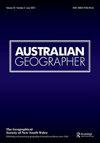将自然纳入自我和亲自然信念:利用环境管理中的心理量表进一步了解与自然的相互联系是否支持可持续成果-以新西兰奥克兰Tāmaki Makaurau为例研究
IF 2
2区 社会学
Q2 GEOGRAPHY
引用次数: 1
摘要
摘要有人断言,为了克服自然退化,环境管理者需要了解人们如何看待自己与自然的关系,因为这会影响他们对自然的信念和行动。为了检验这一论断,本研究探讨了新西兰奥特亚奥克兰Tāmaki Makaurau的960名受试者如何报告自己与自然的关系,以及他们看待自己与自然关系的方式是否影响了他们的亲自然信仰。研究结果表明,尽管大多数受访者认为自己与自然之间存在区别,但他们还是感知到了与自然的某种程度的联系。结果进一步表明,认为与自然完全相互联系的受访者更有可能持有亲自然的信念。相反,认为自我与自然完全分离的受访者不太可能持有亲自然的信念。研究结果表明,如果环境管理者专注于增加个人与自然的相互联系感,以促进和/或增强亲自然的信念,那么积极的环境管理结果可能更容易实现。这项研究呼吁人们注意在环境管理背景下使用心理量表的好处,而这一点目前还缺乏,以了解人们与自然联系的不同方式,从而为更有效的环境管理方案和政策做出贡献。本文章由计算机程序翻译,如有差异,请以英文原文为准。
Inclusion of nature in self and pro-nature beliefs: utilizing psychological scales in environmental management to Further understand if interconnectedness with nature supports sustainable outcomes – A case study in Tāmaki Makaurau Auckland, Aotearoa New Zealand
ABSTRACT It has been asserted that to overcome nature degradation, environmental managers need to understand the ways in which people view themselves in relation to nature as this influences their beliefs and actions toward nature. To examine this assertion, this study explored how 960 subjects in Tāmaki Makaurau Auckland, Aotearoa New Zealand reported themselves in relation to nature, and whether the way in which they viewed themselves in relation to nature influenced their pro-nature beliefs. Results suggested that most respondents perceive some degree of connectedness with nature despite viewing a distinction between themselves and nature. Results further indicate that respondents who perceived complete interconnectedness with nature were more likely to hold pro-nature beliefs. Conversely, respondents who perceived complete separation between self and nature were less likely to hold pro-nature beliefs. The findings suggest that positive environmental management outcomes may be more achievable if environmental managers focus on increasing individuals’ feelings of interconnectedness with nature to prompt and/or enhance pro-nature beliefs. The study calls attention to the merit of deployment of psychological scales in environmental management contexts, which are currently lacking, to understand the divergent ways in which people relate to nature to contribute to more effective environmental management programmes and policy.
求助全文
通过发布文献求助,成功后即可免费获取论文全文。
去求助
来源期刊

Australian Geographer
GEOGRAPHY-
CiteScore
4.10
自引率
8.30%
发文量
33
期刊介绍:
Australian Geographer was founded in 1928 and is the nation"s oldest geographical journal. It is a high standard, refereed general geography journal covering all aspects of the discipline, both human and physical. While papers concerning any aspect of geography are considered for publication, the journal focuses primarily on two areas of research: •Australia and its world region, including developments, issues and policies in Australia, the western Pacific, the Indian Ocean, Asia and Antarctica. •Environmental studies, particularly the biophysical environment and human interaction with it.
 求助内容:
求助内容: 应助结果提醒方式:
应助结果提醒方式:


